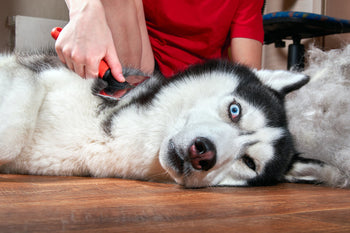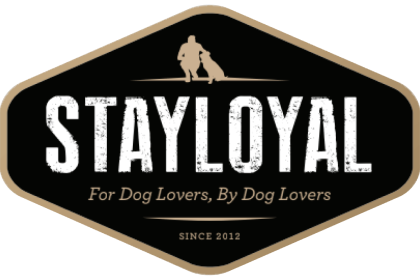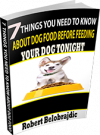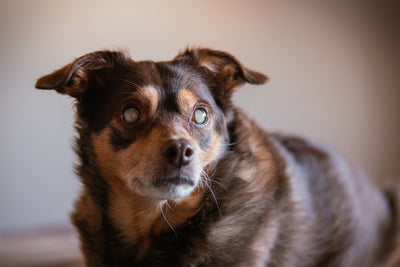Excessive Shedding in Dogs: What You Need to Know

Yes, almost all dogs shed. And the amount they shed varies between breed of dog and time of year. But have you noticed a sudden change in the amount of hair around the house? Excessive shedding in dogs is something owners should be aware of, as it could be telling them something about their dog’s health! Dogs that shed excessively could have allergies, something missing in their diet, or even an infection or a disease.
Dog Shedding Due to Allergies
Probably one of the simplest to diagnose, some allergic reactions can cause a dog to lose more hair – i.e. shed more – such as food allergens or allergies to products put on the coat including shampoos and leave-in sprays. A quick trip to the vet for an allergen test might reveal the culprit.
You can also try eliminating shampoos/sprays currently being used on your dog and switch to hypo-allergenic products and see if the shedding diminishes. Sometimes it’s as simple as not rinsing shampoo and conditioner out of their coat well enough during a bath. Remember to rinse, rinse and rinse again!
Dog Shedding Due to Diet
This is quite common, but may be harder to pinpoint the exact cause. Excessive shedding can be caused by low-quality food or food that is not balanced with the right amount of protein and minerals. Vitamin A is vital for a healthy coat. Dogs with a vitamin A deficiency will often have dry, coarse hair that sheds excessively and mats easily. Other important vitamins and minerals include B-group, C and E, and zinc. One of the symptoms of zinc deficiency is excessive hair loss!
Feeding a diet with high-quality meat as the protein and the correct amounts of vitamins and minerals is important to overall health, not just shedding. Your vet can run a test to see if your dog is deficient in any vitamin(s). If they are, switching dog food could end the excessive shedding – along with a myriad of other issues dietary deficiencies can cause!
Dog Shedding Due to Stress
You may have noticed your dog leaves a puddle of hair every time you leave the vet office. That’s because dogs shed more when they are stressed. Does your dog have behavioural issues such as separation anxiety or reactivity? Have you noticed the excess shed only happens at certain times – when you are gone, when you are vacuuming or when the neighbour kids come? Do they display other signs of stress such as panting, pacing, hiding, whale eye, etc.? If you think your dog’s excessive shedding is due to stress, a positive reinforcement trainer can help you with protocols to relieve the stress and stop the shed. Stress can also be related to deficiencies in diet.
Dog Shedding Due to Parasites, Infection or Disease
Finally, it should be noted that dogs may also excessively shed hair or, more accurately, lose hair, due to some parasites, infections and diseases. Mites often make animals, not just dogs, lose hair. Dogs with thyroid issues often end up with thin coats. So do dogs with Cushing’s disease. Is your dog shedding coat but not getting it back in? If so, this is more of a hair loss situation than excessive shedding and you need to head to the vet to find out what is ailing your dog.
When it comes to a dog that is shedding excessively for their breed and coat type, the answer may be as simple as eliminating an allergen or switching foods. Or you may have to work on some anxiety issues. The big thing is to make sure it truly is just shedding, and not major hair loss, which could be a sign of a more serious medical condition. When in doubt, ask your vet.








